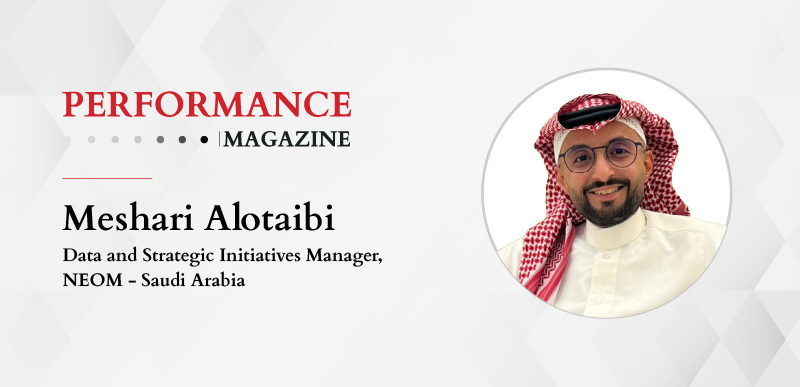Practitioner Interview: How Continuous Feedback Fuels Continuous Improvement

Nothing ever stops in the fast-changing world of business—a fact that is not lost on Meshari Alotaibi, a data and strategic initiatives manager with extensive expertise in management consultancy, data analysis, and leadership.
A Saudi MBA graduate and Doctoral candidate in Management, he recently completed the Executive Postgraduate Diploma in Strategy and Performance from the KPI Institute. Meshari excels in strategy development, performance management, and transformational projects. He currently contributes to strategic initiatives for the consumer protection department at NEOM. In this interview, he touches on the importance of continuous feedback to drive improvement.
Trends
In your opinion, what are the key trends in Organizational Performance Management in 2024?
In 2024, organizations are adopting AI to track performance, foster agility, and enhance employee experience. AI tools provide real-time insights, enabling quick strategy adjustments and continuous improvement.
Which of the existing trends, topics, or aspects within Performance Management have lost their relevance and/or importance in your opinion?
Traditional annual reviews and rigid goals are becoming obsolete. Shifting to continuous feedback has significantly increased employee satisfaction and adaptability to changing business needs.
What does the corporate performance management system of the future look like?
Tomorrow’s systems will be more human-centered, with AI providing real-time feedback and agile goal-setting. AI tools deliver personalized development plans, promoting continuous improvement and engagement.
What will be the major challenges in managing performance in the future, and how should organizations prepare for them?
Challenges include staying ahead of tech changes, ensuring data privacy, and fostering a growth culture. Investing in tech training and robust data protection measures helps organizations stay ahead.
How is technology impacting the way organizations conduct strategic planning and manage performance? Any specific tools you would like to mention?
AI analytics and collaborative platforms are reshaping planning and performance. AI analyzes large datasets, informing strategic decisions and enhancing performance management.
How is sustainability impacting the way organizations conduct strategic planning and manage performance? Any specific aspects you would like to mention?
Sustainability is integral to strategy, focusing on profits and social and environmental impacts. Projects incorporating sustainability metrics ensure that environmental and social factors are part of performance evaluations.
Practice
What should be improved in using strategy and performance management tools to make an organization even more resilient to future crises?
Enhancing resilience requires agile scenario planning and real-time monitoring. During the pandemic, agile performance management systems enabled quick adaptation to remote work environments.
While navigating these challenging times, what would you consider a best practice in performance management?
Effective performance management during crises involves clear communication, flexible goal setting, and adaptability. Regular virtual meetings and adaptable timelines were crucial during remote transitions.
How does benchmarking support improving performance management and target setting systems?
Benchmarking helps identify strengths and weaknesses to set realistic targets. Benchmarking against industry leaders helps set ambitious yet achievable goals, driving continuous improvement and innovation.
Research
Which organizations would you recommend being observed due to their approach to managing performance and its subsequent results? Why?
Google exemplifies innovative performance management that fosters employee growth. Their use of Objectives and Key Results (OKRs) effectively aligns team efforts with organizational goals.
Given their importance in practice, what aspects of Performance Management should be further explored through research?
Research should explore the impact of remote work on performance evaluation and enhancing diversity and inclusion metrics, which are crucial for navigating the post-pandemic work environment and striving for equitable workplaces.
What are the key competencies of a successful business leader (C-level executive)?
Visionary leadership, strategic thinking, and emotional intelligence are essential competencies for successful leaders. Leaders should exemplify these traits to drive ambitious projects with clear vision and adaptive strategies.
What are the key competencies of a strategy and performance manager that are necessary to succeed nowadays?
Successful managers need strong analytical skills, adaptability, and a deep understanding of performance metrics. Managers leverage data analytics to drive strategic decisions and continuously improve performance.
We are developing a database of subjects/degrees in Performance Management. What are your suggestions relevant to the database (i.e., subjects/degrees such as the Masters in Managing Organizational Performance)?
Consider offerings like “Advanced Performance Analytics” or “Strategic Performance Leadership” to deepen understanding. Incorporating real-world case studies enhances relevance.
What are the processes and tools you look at when differentiating a successful performance management system from a superficial one?
As a consultant, I focus on performance management systems that align with organizational goals and have clear metrics and robust feedback mechanisms. Ensuring integration with company culture and focusing on continuous improvement are crucial.
Read More: Practitioner interview: exploring trends and best practices for organizational excellence
Interested in more meaningful insights from professionals across the globe? Browse The KPI Institute’s repository of in-depth interviews here.

